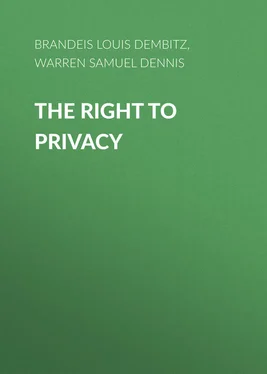Louis Brandeis - The Right to Privacy
Здесь есть возможность читать онлайн «Louis Brandeis - The Right to Privacy» — ознакомительный отрывок электронной книги совершенно бесплатно, а после прочтения отрывка купить полную версию. В некоторых случаях можно слушать аудио, скачать через торрент в формате fb2 и присутствует краткое содержание. Жанр: foreign_antique, foreign_prose, на английском языке. Описание произведения, (предисловие) а так же отзывы посетителей доступны на портале библиотеки ЛибКат.
- Название:The Right to Privacy
- Автор:
- Жанр:
- Год:неизвестен
- ISBN:нет данных
- Рейтинг книги:5 / 5. Голосов: 1
-
Избранное:Добавить в избранное
- Отзывы:
-
Ваша оценка:
- 100
- 1
- 2
- 3
- 4
- 5
The Right to Privacy: краткое содержание, описание и аннотация
Предлагаем к чтению аннотацию, описание, краткое содержание или предисловие (зависит от того, что написал сам автор книги «The Right to Privacy»). Если вы не нашли необходимую информацию о книге — напишите в комментариях, мы постараемся отыскать её.
The Right to Privacy — читать онлайн ознакомительный отрывок
Ниже представлен текст книги, разбитый по страницам. Система сохранения места последней прочитанной страницы, позволяет с удобством читать онлайн бесплатно книгу «The Right to Privacy», без необходимости каждый раз заново искать на чём Вы остановились. Поставьте закладку, и сможете в любой момент перейти на страницу, на которой закончили чтение.
Интервал:
Закладка:
"Injuria, in the narrower sense, is every intentional and illegal violation of honour, i. e. , the whole personality of another." "Now an outrage is committed not only when a man shall be struck with the fist, say, or with a club, or even flogged, but also if abusive language has been used to one." Salkowski, Roman Law, p. 668 and p. 669, n. 2.
16
"It is certain every man has a right to keep his own sentiments, if he pleases. He has certainly a right to judge whether he will make them public, or commit them only to the sight of his friends." Yates, J., in Millar v. Taylor, 4 Burr. 2303, 2379 (1769).
17
Nicols v. Pitman, 26 Ch. D. 374 (1884).
18
Lee v. Simpson, 3 C. B. 871, 881; Daly v. Palmer, 6 Blatchf. 256.
19
Turner v. Robinson, 10 Ir. Ch. 121; s. c. ib. 510.
20
Drone on Copyright, 102.
21
"Assuming the law to be so, what is its foundation in this respect? It is not, I conceive, referable to any consideration peculiarly literary. Those with whom our common law originated had not probably among their many merits that of being patrons of letters; but they knew the duty and necessity of protecting property, and with that general object laid down rules providently expansive, – rules capable of adapting themselves to the various forms and modes of property which peace and cultivation might discover and introduce.
"The produce of mental labor, thoughts and sentiments, recorded and preserved by writing, became, as knowledge went onward and spread, and the culture of man's understanding advanced, a kind of property impossible to disregard, and the interference of modern legislation upon the subject, by the stat. 8 Anne, professing by its title to be 'For the encouragement of learning,' and using the words 'taken the liberty,' in the preamble, whether it operated in augmentation or diminution of the private rights of authors, having left them to some extent untouched, it was found that the common law, in providing for the protection of property, provided for their security, at least before general publication by the writer's consent." Knight Bruce, V. C., in Prince Albert v. Strange, 2 DeGex & Sm. 652, 695 (1849).
22
"The question, however, does not turn upon the form or amount of mischief or advantage, loss or gain. The author of manuscripts, whether he is famous or obscure, low or high, has a right to say of them, if innocent, that whether interesting or dull, light or heavy, saleable or unsaleable, they shall not, without his consent, be published." Knight Bruce, V. C., in Prince Albert v. Strange, 2 DeGex & Sm. 652, 694.
23
Duke of Queensberry v. Shebbeare, 2 Eden, 329 (1758); Bartlett v. Crittenden, 5 McLean, 32, 41 (1849).
24
Drone on Copyright, pp. 102, 104; Parton v. Prang, 3 Clifford, 537, 548 (1872); Jefferys v. Boosey, 4 H. L. C. 815, 867, 962 (1854).
25
"The question will be whether the bill has stated facts of which the court can take notice, as a case of civil property, which it is bound to protect. The injunction cannot be maintained on any principle of this sort, that if a letter has been written in the way of friendship, either the continuance or the discontinuance of the friendship affords a reason for the interference of the court." Lord Eldon in Gee v. Pritchard, 2 Swanst. 402, 413 (1818).
"Upon the principle, therefore, of protecting property, it is that the common law, in cases not aided or prejudiced by statute, shelters the privacy and seclusion of thought and sentiments committed to writing, and desired by the author to remain not generally known." Knight Bruce, V. C., in Prince Albert v. Strange, 2 DeGex & Sm. 652, 695.
"It being conceded that reasons of expediency and public policy can never be made the sole basis of civil jurisdiction, the question, whether upon any ground the plaintiff can be entitled to the relief which he claims, remains to be answered; and it appears to us that there is only one ground upon which his title to claim, and our jurisdiction to grant, the relief, can be placed. We must be satisfied, that the publication of private letters, without the consent of the writer, is an invasion of an exclusive right of property which remains in the writer, even when the letters have been sent to, and are still in the possession of his correspondent." Duer, J., in Woolsey v. Judd, 4 Duer, 379, 384 (1855).
26
"A work lawfully published, in the popular sense of the term, stands in this respect, I conceive, differently from a work which has never been in that situation. The former may be liable to be translated, abridged, analyzed, exhibited in morsels, complimented, and otherwise treated, in a manner that the latter is not.
"Suppose, however, – instead of a translation, an abridgment, or a review, – the case of a catalogue, – suppose a man to have composed a variety of literary works ('innocent,' to use Lord Eldon's expression), which he has never printed or published, or lost the right to prohibit from being published, – suppose a knowledge of them unduly obtained by some unscrupulous person, who prints with a view to circulation a descriptive catalogue, or even a mere list of the manuscripts, without authority or consent, does the law allow this? I hope and believe not. The same principles that prevent more candid piracy must, I conceive, govern such a case also.
"By publishing of a man that he has written to particular persons, or on particular subjects, he may be exposed, not merely to sarcasm, he may be ruined. There may be in his possession returned letters that he had written to former correspondents, with whom to have had relations, however harmlessly, may not in after life be a recommendation; or his writings may be otherwise of a kind squaring in no sort with his outward habits and worldly position. There are callings even now in which to be convicted of literature, is dangerous, though the danger is sometimes escaped.
"Again, the manuscripts may be those of a man on account of whose name alone a mere list would be matter of general curiosity. How many persons could be mentioned, a catalogue of whose unpublished writings would, during their lives or afterwards, command a ready sale?" Knight Bruce, V. C., in Prince Albert v. Strange, 2 DeGex & Sm. 652, 693.
27
"A copy or impression of the etchings would only be a means of communicating knowledge and information of the original, and does not a list and description of the same? The means are different, but the object and effect are similar; for in both, the object and effect is to make known to the public more or less of the unpublished work and composition of the author, which he is entitled to keep wholly for his private use and pleasure, and to withhold altogether, or so far as he may please, from the knowledge of others. Cases upon abridgments, translations, extracts, and criticisms of published works have no reference whatever to the present question; they all depend upon the extent of right under the acts respecting copyright, and have no analogy to the exclusive rights in the author of unpublished compositions which depend entirely upon the common-law right of property." Lord Cottenham in Prince Albert v. Strange, 1 McN. & G. 23, 43 (1849). "Mr. Justice Yates, in Millar v. Taylor, said, that an author's case was exactly similar to that of an inventor of a new mechanical machine; that both original inventions stood upon the same footing in point of property, whether the case were mechanical or literary, whether an epic poem or an orrery; that the immorality of pirating another man's invention was as great as that of purloining his ideas. Property in mechanical works or works of art, executed by a man for his own amusement, instruction, or use, is allowed to subsist, certainly, and may, before publication by him, be invaded, not merely by copying, but by description or by catalogue, as it appears to me. A catalogue of such works may in itself be valuable. It may also as effectually show the bent and turn of the mind, the feelings and taste of the artist, especially if not professional, as a list of his papers. The portfolio or the studio may declare as much as the writing-table. A man may employ himself in private in a manner very harmless, but which, disclosed to society, may destroy the comfort of his life, or even his success in it. Every one, however, has a right, I apprehend, to say that the produce of his private hours is not more liable to publication without his consent, because the publication must be creditable or advantageous to him, than it would be in opposite circumstances."
Читать дальшеИнтервал:
Закладка:
Похожие книги на «The Right to Privacy»
Представляем Вашему вниманию похожие книги на «The Right to Privacy» списком для выбора. Мы отобрали схожую по названию и смыслу литературу в надежде предоставить читателям больше вариантов отыскать новые, интересные, ещё непрочитанные произведения.
Обсуждение, отзывы о книге «The Right to Privacy» и просто собственные мнения читателей. Оставьте ваши комментарии, напишите, что Вы думаете о произведении, его смысле или главных героях. Укажите что конкретно понравилось, а что нет, и почему Вы так считаете.












